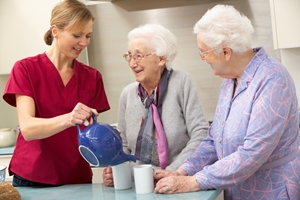

A woman who tripped and fell outside an aged care facility while visiting her father has seen her $346,777 claim reach NSW District Court for consideration.
The plaintiff, who was 70 years old when the accident occurred in June 2015, was exiting the facility when she caught her foot on a raised lip between the brick hatching and a concrete slab in the car park.
She suffered a fractured right elbow and left wrist, lacerations to her nose and lip, and a serious injury to the cruciate ligament of her right knee. The plaintiff also reported a massive tear of the rotator cuff tendon in her right shoulder.
The aged care facility admitted it had a duty of care to the plaintiff, but did the organisation breach this obligation through negligence?
Understanding duty of care breaches
The Civil Liability Act 2002 sets out the criteria for duty of care breaches. Broadly speaking, the plaintiff must prove:
- A substantial or "not insignificant" risk of harm existed;
- The defendant knew or should have known of the risk; and
- A reasonable person would have taken measures to prevent the risk in similar circumstances.
In this particular case, District Court Judge Matthew Dicker had to rule whether the uneven pavement constituted a risk and whether or not the aged care facility was negligent in not remedying the situation prior to an accident.
If successful, the plaintiff submitted that she should receive $139,000 in damages for non-economic losses, as well as more than $200,000 for out-of-pocket expenses and care costs.
Public liability claim decision
Judge Dicker ruled that the aged care facility did not breach its duty of care to the plaintiff.
He argued that while an uneven surface existed in the car park, this was not enough to prove that a breach had occurred.
"Uneven surfaces are regularly encountered on both public and private land and even external to commercial premises," he explained.
"In my opinion, the differential in height did not create a dangerous situation. The defendant had established a system to review outside walkways and had not perceived this as a danger."
This means the plaintiff will not receive compensation unless she successfully pursues an appeal. Nevertheless, the case highlights the complexities that are often at the heart of slip, trip and fall claims.
Contact Gerard Malouf & Partners Compensation, Medical Negligence & Will Dispute Lawyers for a full consultation to help you decide whether your case is likely to succeed.

